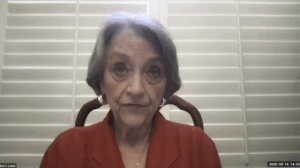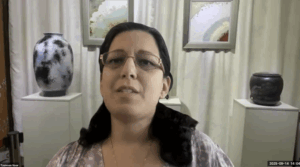[The Episcopal News – Sept. 24, 2025] To reduce the power of hatred – and invite lasting transformation – is possible through understanding, compassion and strategic intervention, but first we must face and hear the truth of one another’s lived experiences, said participants in a Sept. 14 diocesan webinar, “Challenging the Power of Hate: Addressing the Angers and Fears in Our Lives.”
Understanding hatred is a first step to halting its intensification in local communities, said diocesan interfaith minister-in-residence Tasneem Noor, who co-facilitated the online gathering, along with moderator Dot Leach, chair of the diocesan Program Group on Ecumenical and Interfaith Life and a lay leader at St. John Chrysostom Episcopal Church in Rancho Santa Margarita.
The webinar is available here as a resource for congregations.
Noor cited the UCLA Initiative to Study Hate, a three-year pilot program designed to research, understand and mitigate group-based hate. She described hatred as an intense emotion, generational in nature, arising out of one group’s sense of feeling wronged by another, or the fear that they will be harmed.
“Another reason to hate is… moral superiority, a belief that the target of their hate is morally inferior to themselves. Ironically, those who hate often see themselves as the wronged party, rather than as the aggressor.”
However, the initiative also found that lasting transformation is possible “with a balanced approach, a call to acknowledge harm while maintaining human dignity,” she said.
‘Massive increase’ in reported hate crimes in L.A.
L.A. County has experienced a “massive increase” in reported hate crimes and incidents in recent years, L.A. County Human Relations Commission Assistant Executive Director Robert Sowell told the gathering.
Most frequently reportedly targeted among racial groups were African Americans, followed by Latinos and Asians, according to a commission report. Jewish people were the most disproportionately targeted among religious groups; attacks against Trans persons rose by 125% in 2023, and gay men were a primary target within the LGBTQ+ community, he said.
“I say reported because we need to recognize that most crime and particularly hate crimes and hate incidences, are not reported,” Sowell said. “They tend to be the same kinds of offenses, year after year, vandalism, simple assault, intimidation, aggravated assault.”
Although diversity has been hailed as a cornerstone of U.S. culture and society, the nation’s failure to grapple with hatred constructively stems from an historic inability to directly confront its root causes, capitalism and greed, Canon Suzanne Edwards-Acton, chair of the diocesan Program Group on Black Ministries, said.
“It’s an old, old story. We think we love diversity. We think we love equity. We think we love inclusion. And actually, as a country, we don’t love those things,” said Edwards-Acton, who is also founder of My Work To Do, an anti-racism accountability group. “We are a group of people who does not speak about the truth of who we are.”
Finding a nonthreatening way to share experiences is one step, she added. Yet, such conversations can be “interpreted as, ‘I’m trying to push shame on you (when) no, actually, I’m just trying to share with you my lived experience’.”
Bullying—in all its forms and especially of children with disabilities—is also at an all-time high, said Judy French, the west coast coordinator for Pacer’s National Bullying Prevention Center. The center provides anti-bullying resources to schools and community groups. “Children with disabilities are bullied at a rate of about two to three times their peers without disabilities,” which led to the founding of NBPC in 2006.
“Bullying is about power (and) …. these learned behaviors, learning to use power negatively as a child over another child, is not something that has to happen,” French told the gathering.
Antidotes include teaching children to become self-advocates. “There is equal power in teaching kids about how to have healthy relationships, about how to manage conflict so it doesn’t blow up, about how to use positive social behaviors to create community where bullying can’t take hold.”
She added: “What is the adult responsibility – because bullying is truly an adult responsibility, not that of the child. If you want to counter that power of hate and hopelessness, one of the ways you can give power back to kids is to teach them to speak up effectively and respectfully for themselves.”
The power of hate and hopelessness
Two other panelists, Danny Guerrera, a freelance Salvadoran community educator who works with L.A.’s LGBTQ Center, and Citlali Aleji, a member of Lucha-Zapoteca, an activist group, formed when 14 of the Indigenous Zapotec community from Oaxaca, Mexico, were detained in a June 2025 ICE raid in L.A., described the toll the climate has taken on their communities.
Political rhetoric, social media hazing, bullying and hate incidents had prompted Guerrera, who has been transitioning for about ten years, to entertain suicidal thoughts recently, for the first time in years, he said.
“One of the first things I had to learn when I started getting read as a man from being on hormone therapy, is that a lot of men resolve conflict with violence,” he said.
He has experienced name-calling, bullying and confrontation when riding public transit and even within LGBTQ+ spaces, he said. “I have been told, ‘you can’t be on this bus. Get off or I will kick your a–. And I had to be like, well, I guess I’ll get off and catch the next one.
“Or, there is loud, aggressive conversation near me, debating my gender, debating why I’m dressed the way I am, debating what my sexual preferences must be.”
The culture breeds misogyny instead of self-reflection and the capacity to sit with one’s discomfort when experiencing diversity, and to learn from it, he said. Frequently, the discomfort becomes aggression.
“Misogyny teaches men to hate so much of their own feelings,” said Guerrera, who also experiences autism. Like, “‘We have to ostracize you; you have to be this specific form of palatability, because it makes me feel better.’ Or ‘you did this to me. You hurt me.’ Instead of thinking, ‘why don’t I feel good? Why does this person existing in the same space as me, make me feel bad? And why does this person telling me about their different experience from mine make me feel so defensive that my instinct is to push them away, rather than sit with that feeling?’”
Guerrera, who suffers from chronic pain, also raises awareness about sexual ableism, which “refers to discrimination of disabled people,” he said. “It’s a form of ableism around sexual attraction, romantic love.
“A common example is, ‘Oh, you’re disabled, you’re not a potential partner. You’re not a person who is dateable. Or you’re disabled, your partner is inherently your caregiver, right? There is the innate assumption that my disabilities inherently burden us, and my partner is therefore a saint for dealing with me. The funny thing is, I do a lot around the house.”
Guerrera said speaking out involves risking become a social media target. Among Trans youth and his peers, he has noticed an increasing rate of depression. Trans people of color are disproportionately targeted, he said.
“It is terrifying to have to sit down with my loved ones, my chosen family, the people I live with, and say you need to know where all my paperwork is, because half of my paperwork was from another country, and I can’t change my name or my gender marker on it. My paperwork to prove I’m a legal citizen has a different name on it, and we’re seeing people who have citizenship, people who were born here, people who are indigenous to this land, get detained for deportation. I am in a very precarious situation, in which half my paperwork doesn’t match because I changed my name and there’s no way for me to change it back in my home country.”
Political vitriol has ramped up historic racist beliefs, which are affirmed and magnified on social media, often leading to cyber bullying and causing despair, he said.
“This is what this administration wants. They want to wear people down that are marginalized. They want to bog us down, so we’re so exhausted all the time that we don’t push back. This stuff is interconnected. Unfortunately, it is something we have been facing this entire time, because trans people are less palatable than gay people, and we’re seeing that as we see more and more LGB without the T,” he said.
Fourteen members of Aleji’s family were detained in a June 2025 ICE raid at a L.A. warehouse, she said. A cousin, “Oscar”, whose real name was withheld to protect his identity, was released but he still faces legal charges and was unable to discuss the situation publicly, said Aleji, a senior organizer for an Oakland, California immigrant worker center.
She said about 50 men were detained the day of the raid, and that Oscar was held for about two months. Eleven of the 14 have been released, but “the raids have not stopped in Los Angeles.”
Confronting hatred at home and in our lives
A video presented during the webinar, in which the Rev. Joel Webbon of the Covenant Bible Church near Austin, Texas, encouraged white parents to warn their children of the dangers of “Black strangers,” sparked spirited discussion.
“I’m struggling to process it,” said the Rev. Michael Fincher, rector of St. Gregory’s Church in Long Beach. “Where’s the Gospel in this? Where’s God? Where’s the Christ that we know and love and worship who says love your neighbor as yourself? This is perpetuating fear. We are all beloved children of God.”
Marco White, a parishioner at St. Barnabas Church in Pasadena, suggested the focus shift back to the L.A. diocese. “We’re engaging in safe criticism of them when we should be reflective of us. There are people on this call who attend churches who are blocks away from one another and have had no relationship with one another for centuries and centuries of systemic race-based reasons.
“It’s part of that age-old practice of criticizing them without holding ourselves accountable to Christian love. I would suggest that we don’t criticize Austin if All Saints, Pasadena, has no relationship with St. Barnabas, Pasadena.”
Sowell agreed. “We don’t have to go to Austin to find this. It is something that is not uncommon right here. We attempt to rationalize hatred, but it’s not rational. So, when we address it, we have to make sure that we’re doing it in a way that’s not limited to facts or research because we can do all that we want to, and we will have made no dent in it. It doesn’t come from rational conclusions. It comes from different spaces which we must address if it’s going to be eliminated.
Leach agreed. The current climate may seem “too large, too stressful, too painful, too political” to change, but unless action is taken, it will continue, she said. “I recently saw a meme that said, when political views result in the suffering of another human being, they are no longer political views. They are moral choices.
“Every day we must check ourselves and see how we are challenging the power of hate around us in whatever version it is coming,” Leech added. “I know this sounds like a huge burden but imagine the burdens our siblings are going through. So, when we see something, say something. Most of all, we all want peace.”


